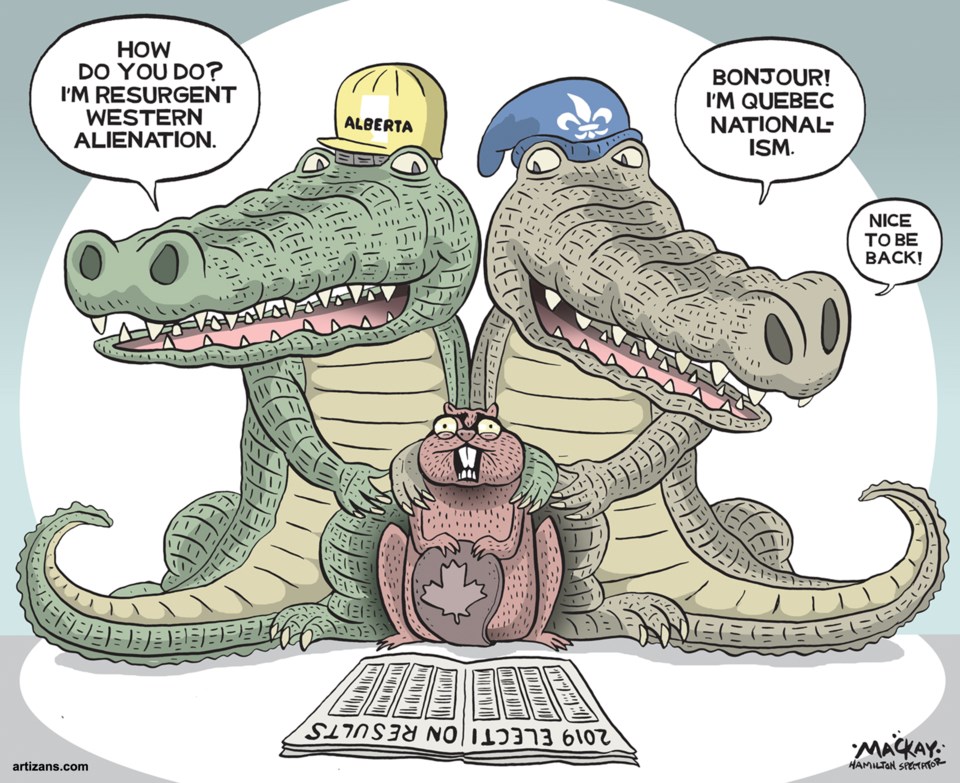“Western alienation will only grow.”
That’s what former Saskatchewan premier Brad Wall said in a panel during Global’s election coverage on Oct. 21. “Mr. Trudeau’s brand is toxic, in Alberta, and in Saskatchewan, and in Ontario, and British Columbia and much of Manitoba. And if it’s followed up by policies by some new minority government, led by Mr. Trudeau, then we’ve got issues.”
Earlier in the night, another former Saskatchewan premier, Roy Romanow, also spoke of western alienation.
And he’s got some experience with separatists, having led this province during the 1995 near death experience that was the second Quebec referendum.
Lisa LaFlamme asked him about separatism in Quebec, with the rise of the Bloc Quebecois. Romanow countered by saying, “I do see it rising from the western part of the nation. It isn’t quite as open and dynamic as it was in the days of René Lévesque, during those periods, but it clearly is evident now, and being present.
“Out here in the West, there’s a concern they’re being blocked. People are being blocked, for example, in the pipeline development and in the oil and natural gas area. That our votes don’t really count for much. We don’t really have much strength. And to me, the biggest concern from this election, apart from individuals, very important individuals, of course, are these big issues. The issues of national unity, and whether or not we’ve got the leadership or the mechanisms to be able to resolve, or work to resolution… in a way that says we are committed to a united Canada. I think it’s a little bit underground, but I’m getting sense of that in my constituency of friends.
To have Wall and Romanow essentially spouting the same thing, that’s saying something.
In his victory speech, newly re-elected Prime Minister Justin Trudeau made the usual sop to Quebec separatist sentiments, as has pretty much every prime minister going back forever and a day. But then he said something quite different.Ěý
“To Canadians in Alberta and Saskatchewan, know that you are an essential part of our great country. I’ve I heard your frustration, and I want to be there, to support you. Let us all work hard to bring our country together.”
Why would he say that, unless there was a recognition that the tenous threads that hold Canada together are being torn asunder? Why not mention the other provinces?
That’s because there is an issue alright, and he’s the primary one pulling the threads apart.
He might have said, “There is so much more that unites us, than divides us,” later on in that speech, but that’s not what we heard on the phones that night.
On election night we called several people in the oilpatch across Saskatchewan. Most now think western separatism is an issue. A very serious issue. More on that in a minute.
Danielle Smith tweeted, “I wasn’t joking when I said launched a separatist movement in Alberta tonight. Here’s a petition that signed up 2200 people in the first two hours.”
Indeed, various separatism-themed social media pages, like VoteWexit.com and Alberta Separatism, gained tens of thousands of followers in hours. But as we learned from the Yellow Vest page about 10 months ago, that doesn’t necessarily translate into a lot of action.
Drew Lake was one of the people we called. He put it this way: “They say that there’s three types of Alberta separatists, or western separatists, coming up to this election. There are the ones that are willing to separate, regardless of the election results. There were the ones who had no interest in separating, regardless of the election results. And there was a big group who were sitting back to see what happened. If it was a Conservative majority, that movement would have died off to quite a degree. But that third group, they say, is an absolute monster that’s laying in the shadows. If you add up the two groups in favour of separation, that’s in the 60-65 per cent range, far in excess of what Quebec was ever able to muster up.”
Lake made a Facebook post on election night saying, “Let’s start having these talks,” was shared nearly 100 times in an hour. In it, he said, “I say we hold a non-partisan emergency meeting in Lloydminster this Saturday, October 26th. We need to gauge support forĚýthis movement and discuss some ideas on how we proceed.”
That’s not latent resentment. That’s people willing to start taking action.
This is a very real crisis, folks.
One of the primary reasons behind the current federal equalization payment structure is because it essentially bribes Quebec to stay in Canada. And those bribes are paid for buy western oil, pure and simple. We are hearing it loud and clear: if that’s the way its going to be, we, in the west, are just about done.
What could the federal government do to solve this? First, restructure equalization dramatically, and include hydroelectric power generation in the equation. Second, build the Energy East pipeline, right now. The plans are all there. Just dust them off and do it, immediately. Start surveying and get shovels in the ground next summer. Get EVRAZ to put on another shift if need be.
Those two actions would nip this entire separation concept in the bud, probably for good. But will this re-elected Liberal government do either of those things? Not a chance.
Building a $23 billion pipeline might be the cheapest option, compared to what we could lose otherwise. That would be our united country.
Ěý
Ěý
Ěý




